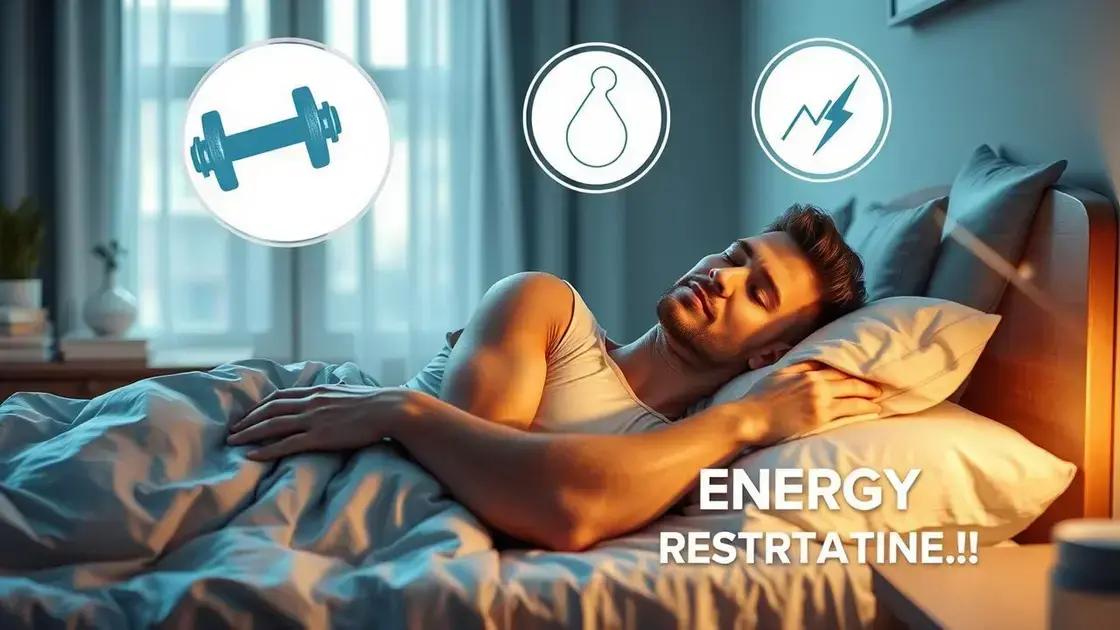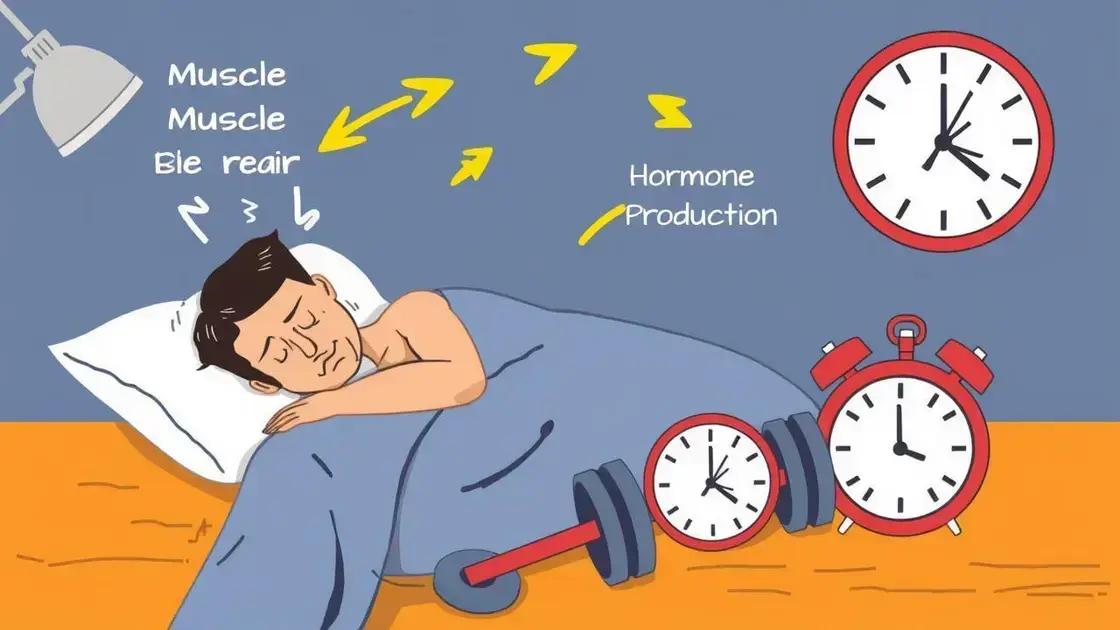To optimize sleep for recovery and muscle growth, prioritize quality sleep by maintaining a consistent sleep schedule, creating a sleep-friendly environment, and understanding the impact of sleep on hormone production and muscle repair.
Optimizing sleep for recovery and muscle growth is crucial for anyone looking to enhance their fitness journey. Inadequate sleep can hinder performance, slow down recovery, and even affect muscle growth negatively. This article will delve into the significance of quality sleep, providing tips to improve your sleep quality and creating a perfect environment for restful nights. Understanding how sleep impacts recovery and muscle development can bring you closer to your fitness goals.
The Importance of Sleep for Muscle Recovery

The importance of sleep for muscle recovery cannot be overstated. Sleep plays a crucial role in various physical processes that repair and build muscle.
When we sleep, our bodies enter a state of recovery. This is when muscles heal and grow stronger.
Hormones and Muscle Recovery
During sleep, the body releases important hormones such as growth hormone. This hormone stimulates tissue growth and muscle repair. Higher levels of growth hormone during deep sleep improve recovery times and enhance overall muscle development.
Energy Restoration
Sleep restores energy. It helps replenish glycogen stores that muscles use during exercise. Without adequate sleep, energy levels drop, leading to reduced performance and longer recovery times.
Immune Function
Adequate sleep enhances the immune system, which is essential for healing. A strong immune system helps prevent illnesses that can interfere with your workout schedule and progress.
Sleep Quality Matters
Not just the amount, but the quality of sleep impacts muscle recovery. Deep, uninterrupted sleep is vital. Measuring sleep quality can help improve recovery strategies.
In summary, prioritizing sleep is key for anyone focusing on muscle recovery and growth. Quality sleep supports hormone production, energy restoration, and immune function.
Tips for Improving Sleep Quality

Improving sleep quality is essential for muscle recovery and overall health. Here are some tips to help you maximize your sleep:
1. Establish a Sleep Schedule
Go to bed and wake up at the same time every day. This consistency helps regulate your body’s internal clock. A regular sleep schedule can improve sleep quality over time.
2. Create a Relaxing Bedtime Routine
Try activities like reading, taking a warm bath, or practicing yoga before bed. These relaxing habits can signal your body that it’s time to wind down.
3. Limit Screen Time
Reduce exposure to screens at least an hour before bedtime. The blue light emitted from phones, computers, and TVs can disrupt your body’s production of melatonin, the hormone responsible for sleep.
4. Optimize Your Sleep Environment
Make your bedroom a haven for sleep. Keep the room cool, dark, and quiet. Consider using blackout curtains, earplugs, or a white noise machine to enhance your sleeping conditions.
5. Mind Your Diet
Avoid large meals, caffeine, and alcohol close to bedtime. These substances can interfere with your ability to fall asleep and stay asleep.
6. Stay Active During the Day
Regular physical activity can help you fall asleep faster and enjoy deeper sleep. Try to get at least 30 minutes of exercise most days, but avoid vigorous activity close to bedtime.
7. Manage Stress
Stress can lead to sleep issues. Practice relaxation techniques such as deep breathing, meditation, or journaling to manage stress better before bedtime.
Implementing these tips can help improve your sleep quality, benefiting your recovery and muscle growth.
How Sleep Affects Muscle Growth

Sleep has a significant impact on muscle growth. When you sleep, your body goes through various phases that are critical for muscle repair and growth.
Muscle Repair During Sleep
During deep sleep, the body increases protein synthesis. This process is essential for repairing damaged muscle fibers after workouts. Without enough sleep, this repair process can slow down, hindering muscle growth progress.
Hormonal Balance
Sleep affects hormone levels, particularly testosterone and growth hormone. Both hormones are important for muscle development. Low sleep duration has been linked to decreased levels of these hormones, which may reduce the effectiveness of your training.
Energy Levels and Performance
Good quality sleep restores energy levels. When you are well-rested, you perform better in workouts. Increased performance leads to more effective training sessions, promoting muscle growth.
Sleep Deprivation Effects
Lack of sleep can lead to increased levels of cortisol, a stress hormone. High cortisol levels can break down muscle tissue and hinder gains. This underscores the importance of quality sleep in maintaining muscle mass.
In summary, sleep is crucial for muscle growth. It aids in muscle repair, hormonal balance, and enhancing workout performance, all of which are vital for optimal muscle development.
Creating a Sleep-Friendly Environment

Creating a sleep-friendly environment is essential for optimizing sleep for recovery and muscle growth. Here are some effective strategies to set up your space:
1. Control the Light
Light can greatly affect your sleep. Make your bedroom dark by using blackout curtains or blinds. Avoid bright lights in the evening and consider using a sleep mask to block out any remaining light.
2. Maintain a Comfortable Temperature
Your sleep environment should be cool and comfortable. The ideal bedroom temperature is usually between 60 to 67 degrees Fahrenheit. Use fans or air conditioning to help regulate heat during warmer months.
3. Reduce Noise
Noise can disrupt your sleep quality. Consider using earplugs or a white noise machine to create a soothing sound environment. Alternatively, calming music can also help drown out disruptive sounds.
4. Choose the Right Bedding
Comfortable bedding is crucial for sleep. Invest in a quality mattress and pillows that support your sleeping position. Choose soft, breathable sheets to enhance comfort and regulate body temperature.
5. Keep the Room Tidy
A cluttered space can add stress and be distracting. Keep your bedroom organized and free of unnecessary items to create a calming atmosphere.
6. Limit Electronics
Remove electronic devices from your bedroom. The blue light from screens can interfere with your body’s natural sleep cycle. Try to keep TVs, computers, and smartphones out of the sleeping area.
Implementing these suggestions can help create a sleep-friendly environment that promotes restorative sleep, essential for effective recovery and muscle growth.
In Summary: Optimize Your Sleep for Recovery and Growth
Understanding the critical role of sleep in muscle recovery and growth is essential for anyone serious about fitness. Quality sleep enhances muscle repair, balances hormonal levels, and improves overall performance.
By implementing tips to improve sleep quality and creating a sleep-friendly environment, you can better support your body’s recovery process. Paying attention to factors like light, noise, temperature, and bedding can make a significant difference in your sleep experience.
Prioritizing sleep is not just a lifestyle choice; it’s a necessary component of effective training. Remember that better sleep leads to better workouts and ultimately, better results in your fitness journey.
FAQ – Frequently Asked Questions about Optimizing Sleep for Recovery and Muscle Growth
Why is sleep important for muscle recovery?
Sleep is crucial for muscle recovery as it enhances protein synthesis, allows for hormone regulation, and restores energy levels, all essential for muscle growth.
How can I improve my sleep quality?
You can improve sleep quality by establishing a consistent sleep schedule, creating a relaxing bedtime routine, and optimizing your sleep environment.
What is a sleep-friendly environment?
A sleep-friendly environment is a space that promotes restful sleep, characterized by darkness, cool temperatures, minimal noise, and comfortable bedding.
How does sleep affect hormone levels?
Adequate sleep supports the production of hormones like testosterone and growth hormone, which are important for muscle growth and recovery.
What are some tips for creating a sleep-friendly environment?
To create a sleep-friendly environment, control light, minimize noise, maintain a comfortable temperature, and keep the bedroom tidy and free of distractions.
Can lack of sleep impact my workout performance?
Yes, lack of sleep can reduce energy levels, impair focus, and negatively affect performance during workouts, hindering your fitness progress.













